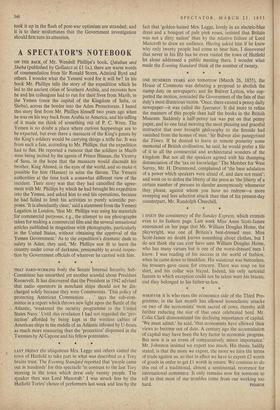ONE HUNDRED YEARS AGO tomorrow (March 26, 1855), the House
of Commons was debating a proposal to abolish the stamp duty on newspapers; and Sir Bulwer Lytton, who sup- ported the motion, reminded the Government of the fate of that duty's most illustrious victim. 'Once, there existed a penny daily newspaper—it was called the Spectator. It did Inore to refine the manners of this people than half the books in the British Museum. Suddenly a half-penny tax was put on that penny paper, and so one fatal morning the most pleasing and graceful instructor that ever brought philosophy to the fireside had vanished from the homes of men.' Sir Bulwer also panegyrised the Times. If he desired to leave to remote posterity some memorial of British civilisation, he said, he would prefer a file of it to all the commercial and architectural wonders of the kingdom. But not all the speakers agreed with his thumping denunciation of the 'tax on knowledge.' The Member for West Surrey, Mr. H. Drummond, complained of 'the base adulation of a power which speakers were afraid of, and dare not resist': and went on to define the liberty of the press as 'the liberty of a certain number of persons to slander anonymously whomever they please, against whom you have no redress—a more sweeping and less selective attack than that of his present-day counterpart, Mr. Randolph Churchill.


































 Previous page
Previous page